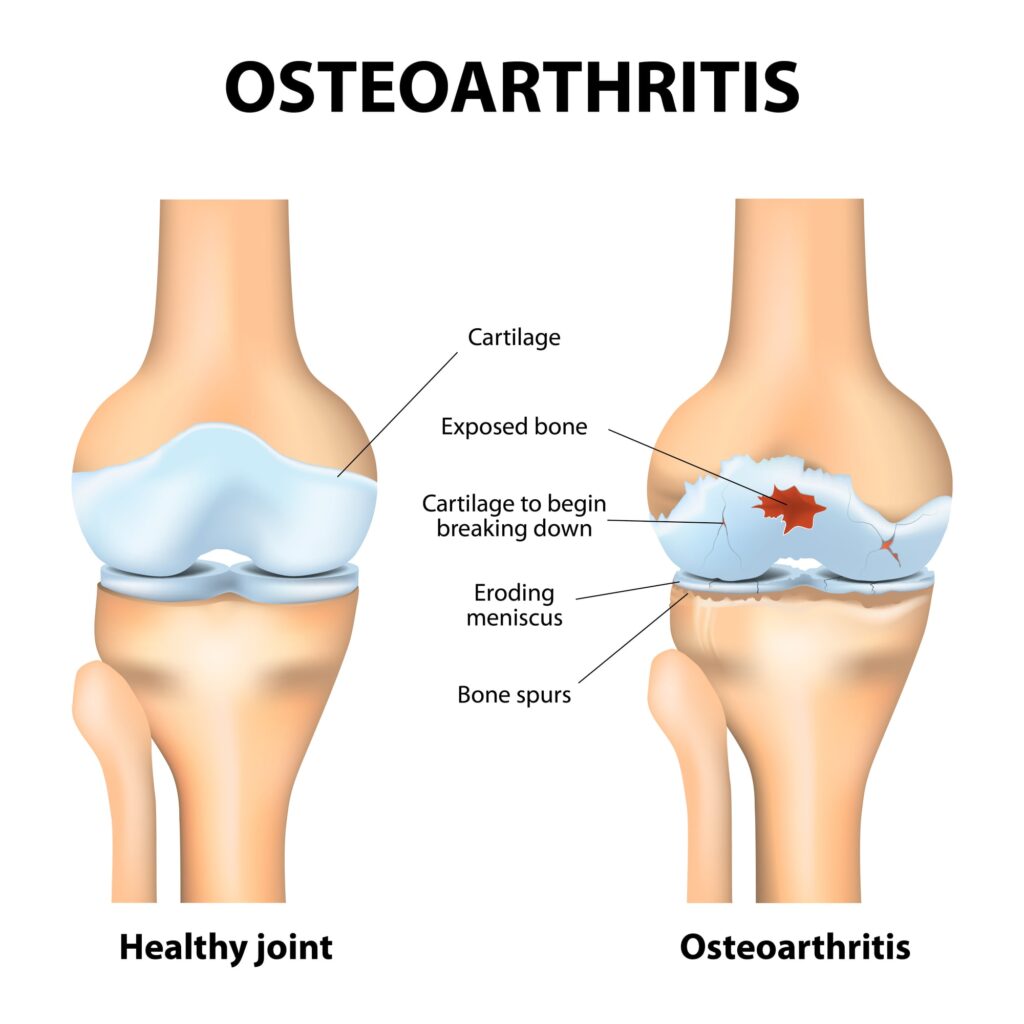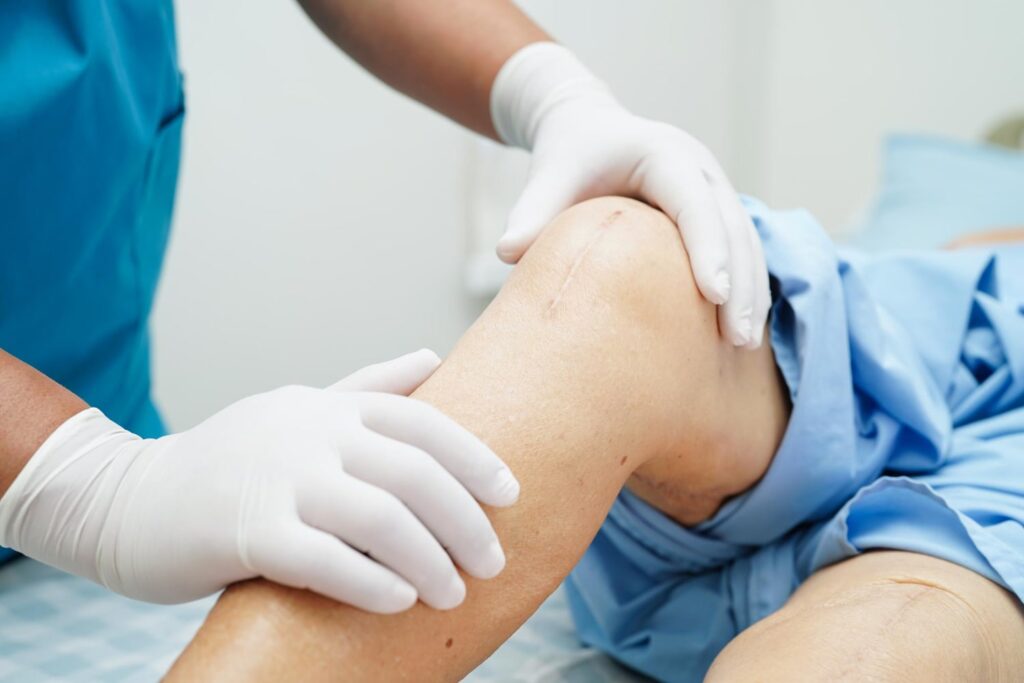Hyaluronic acid (HA) is a versatile disaccharide sugar molecule that plays a critical role in orthopedic medicine, particularly for the treatment of osteoarthritis.
In this article, we will discuss the various applications of hyaluronic acid, its mechanism of action, and its potential benefits for arthritis patients.
Hyaluronic Acid in Orthopedic Medicine
Hyaluronic acid is a naturally occurring substance found throughout the body. Its applications extend beyond orthopedic medicine, as it is also utilized in plastic surgery as a facial filler.
However, in the musculoskeletal world, HA has garnered attention for its potential to treat osteoarthritis and, to a lesser extent, tendon problems.
Causes and Treatment of Osteoarthritis

Osteoarthritis is a degenerative joint condition that commonly affects individuals as they age. Various factors contribute to the development of osteoarthritis, such as age, trauma, previous surgery, genetics, lifestyle choices, and occupation.
The primary goal of treating osteoarthritis is pain control, with secondary goals including delaying the progression of the disease. However, treatments that effectively delay osteoarthritis progression remain limited.
Numerous treatment options are available for osteoarthritis, depending on the affected joint. These include physical therapy, warming up before exercise, cold packs, braces, and activity modification.
Medications like ibuprofen, naproxen, and celecoxib can provide pain relief but do not alter the disease state.
Natural anti-inflammatory supplements, such as glucosamine, chondroitin, cherry juice extract, and turmeric, can also help alleviate symptoms.
Role of Hyaluronic Acid in Arthritis Treatment

Hyaluronic acid injections can play a pivotal role in the treatment of osteoarthritis. In the United States, Hyaluronic Acid injections are only officially approved for knee osteoarthritis, but off-label usage for other arthritic joints is common.
The potential benefits of HA injections stem from their ability to lubricate and decrease friction within the joint, maintain water health, provide structural stability, and block nerve fiber stimulation.
Furthermore, Hyaluronic Acid demonstrates anti-inflammatory properties by blocking the production of inflammatory compounds and promoting the activity of anti-inflammatory compounds.
Mechanisms of Action
Hyaluronic acid works in conjunction with other chemicals in the joint to stabilize the joint surface. It serves as an elastic and viscous supplement that reduces stress across the joint, enabling smoother movement.
By binding with CD44 receptors, HA helps upregulate the metabolism of cells, promoting the production of normal joint proteoglycans, collagen, and other molecules.
Additionally, HA blocks the inflammation of IL-1 and metalloproteases, compounds responsible for pain, inflammation, and joint destruction. As an antinociceptive agent, HA obstructs pain-producing compounds and coats nerve endings, preventing the stimulation of nerves.
| Mechanism of Action | Technical Details |
|---|---|
| Pain Relief | Hyaluronic acid injections reduce inflammation in the joint, which relieves pain associated with arthritis. |
| Lubrication | The hyaluronic acid injection acts as a lubricant in the joint, which reduces friction and pain. |
| Stimulating Healing | Hyaluronic acid injections stimulate the production of glycosaminoglycans and proteoglycans, which help to repair damaged cartilage. |
| Increasing Mobility | Hyaluronic acid injections can improve the flexibility of the joint and reduce stiffness, which can help increase mobility. |
Hyaluronic Acid Injections:
Hyaluronic acid injections can vary in terms of molecular weight, structure, and manufacturing process.
Larger molecules and cross-linked structures tend to be more effective and have a longer residual time within the joint.
In the United States, at least 14 different HA compounds are available, with some derived from rooster combs and others produced through bacterial fermentation. The latter tends to be purer and contain fewer contaminants.
Effectiveness and Controversy

The effectiveness of Hyaluronic Acid injections for treating osteoarthritis, particularly in the knee, remains a topic of debate among experts. However, studies have shown that early-stage osteoarthritis patients tend to respond better to HA injections, with benefits lasting up to six months or longer.
Larger molecules generally provide better relief, and recent research has suggested that single injections are not as effective as a series of two to four injections. Interestingly, five injections did not seem to yield better results than two to four injections.
This indicates that repeated injections may enhance the overall response.
Examining the Research on Hyaluronic Acid Injections:
When reviewing the evidence, most studies compare hyaluronic acid injections to saline injections or cortisone injections. In summary, blinded studies (where patients were unaware of the type of injection they received) found that hyaluronic acid injections were not significantly better than a placebo.
However, unblinded studies (where patients knew they were receiving hyaluronic acid injections) reported better results than placebo. One unblinded study did not find a significant benefit when comparing hyaluronic acid injections to steroid injections.
Observational studies examining patient outcomes following hyaluronic acid injections have reported improvements, thus justifying the use of the injections. However, expert recommendations on the use of hyaluronic acid injections vary:
- The American Association of Orthopedic Surgeons does not recommend them.
- The American College of Rheumatology does not recommend them as a first-line treatment.
- The European Society for Clinical and Economic Aspects of Osteoporosis and Osteoarthritis recommends them if a patient does not benefit from medications alone.
- Osteoarthritis Research Society International recommends them after discussing the risks and benefits with the patient.
One study suggested that repeated cycles of injections might provide more pain relief, with a 10% increase in patient response during the second cycle.
Safety and Applications:
Hyaluronic acid injections, particularly those derived from bacterial fermentation, are considered safe for repeated use due to their low contaminant levels. Some evidence even suggests that repeated injection series can delay the need for total knee replacement surgery.
Although HA injections are only officially approved for knee osteoarthritis in the United States, many practitioners use them off-label to treat other arthritic joints, such as the hands, hips, ankles, and big toes. This off-label usage is largely due to the safety profile of Hyaluronic Acid as a natural and versatile molecule.
Comparing Hyaluronic Acid and Cortisone Injections
Cortisone injections involve the administration of corticosteroid medication into the knee joint, acting as an anti-inflammatory agent to alleviate swelling and pain. However, cortisone injections may have side effects, such as increased blood sugar, increased blood pressure, and potential cartilage degeneration with repeated use.
On the other hand, hyaluronic acid injections do not have the systemic side effects associated with cortisone injections. Though they may cause local side effects, like arthritis flare-ups and injection site pain and swelling, they do not carry the same concerns about cartilage degeneration.
Conclusion
Hyaluronic acid has emerged as a promising treatment option for individuals suffering from osteoarthritis. By providing joint lubrication, structural stability, and pain relief, HA injections can alleviate symptoms and potentially delay the progression of the disease.
While some controversy remains regarding their effectiveness, many practitioners and patients have found them to be beneficial in managing arthritis symptoms.
Further research may help clarify the optimal usage of hyaluronic acid injections for various forms of arthritis and provide additional insights into its potential benefits.
MD, PhD. Physical Medicine & Rehabilitation Physician from São Paulo - Brazil. Pain Fellowship in University of São Paulo.

